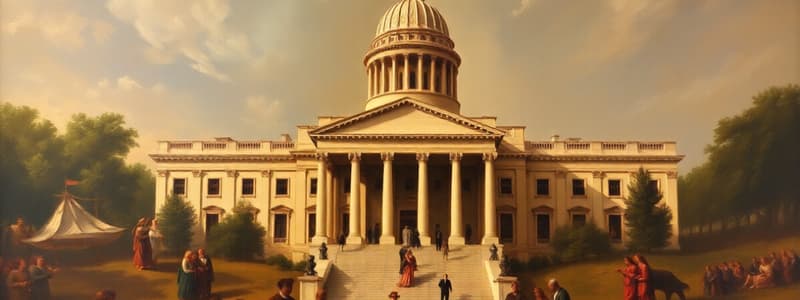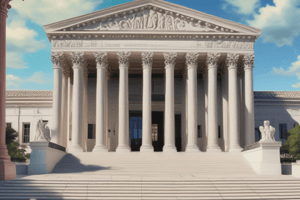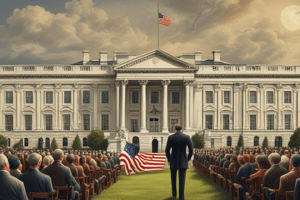Podcast
Questions and Answers
Explain the primary role of the executive branch in the US government.
Explain the primary role of the executive branch in the US government.
The executive branch enforces and executes laws passed by the legislative branch. It is headed by the President, who is responsible for carrying out the laws and overseeing the government's day-to-day operations.
Which of the following is NOT a component of the legislative branch?
Which of the following is NOT a component of the legislative branch?
- Supreme Court (correct)
- President's Cabinet
- House of Representatives
- Senate
The concept of _______ ensures no single branch of government becomes too powerful by giving each branch the ability to check the others.
The concept of _______ ensures no single branch of government becomes too powerful by giving each branch the ability to check the others.
checks and balances
The Senate and House of Representatives have equal representation from each state.
The Senate and House of Representatives have equal representation from each state.
Match the following branches of government with their primary functions:
Match the following branches of government with their primary functions:
Give an example of how the judicial branch checks the power of the legislative branch.
Give an example of how the judicial branch checks the power of the legislative branch.
Explain the main idea behind the economic theory of mercantilism.
Explain the main idea behind the economic theory of mercantilism.
How did mercantilism impact trade between the colonies and Great Britain?
How did mercantilism impact trade between the colonies and Great Britain?
What was the main reason for the creation of the Constitution?
What was the main reason for the creation of the Constitution?
The Anti-Federalists opposed the Constitution because they believed it would give too much power to the states.
The Anti-Federalists opposed the Constitution because they believed it would give too much power to the states.
Explain the main difference between the House of Representatives and the Senate.
Explain the main difference between the House of Representatives and the Senate.
The ______ Compromise determined that three-fifths of the enslaved population would count towards a state's total population for representation in the House of Representatives.
The ______ Compromise determined that three-fifths of the enslaved population would count towards a state's total population for representation in the House of Representatives.
Match the following amendments with their corresponding rights:
Match the following amendments with their corresponding rights:
Which of these precedents did George Washington set during his presidency?
Which of these precedents did George Washington set during his presidency?
Thomas Jefferson and Alexander Hamilton agreed on the interpretation of the Constitution and the role of the federal government.
Thomas Jefferson and Alexander Hamilton agreed on the interpretation of the Constitution and the role of the federal government.
What were the main arguments of the Federalists in favor of the Constitution?
What were the main arguments of the Federalists in favor of the Constitution?
The ______ Rebellion, a protest against taxes levied by the new government, served as a reminder of the need for a stronger national government capable of maintaining order and enforcing laws.
The ______ Rebellion, a protest against taxes levied by the new government, served as a reminder of the need for a stronger national government capable of maintaining order and enforcing laws.
Which of these actions did George Washington take to establish the power of the federal government?
Which of these actions did George Washington take to establish the power of the federal government?
What was a major reason for the French and Indian War?
What was a major reason for the French and Indian War?
The Stamp Act was a tax on all paper goods, including newspapers and legal documents.
The Stamp Act was a tax on all paper goods, including newspapers and legal documents.
How did the Townshend Acts contribute to the growing tension between the colonies and Britain?
How did the Townshend Acts contribute to the growing tension between the colonies and Britain?
The ______ was a major turning point in the Revolutionary War, convincing France to join the American side.
The ______ was a major turning point in the Revolutionary War, convincing France to join the American side.
Match the following events with their corresponding years:
Match the following events with their corresponding years:
Which of the following was NOT a major weakness of the Articles of Confederation?
Which of the following was NOT a major weakness of the Articles of Confederation?
The colonists' familiarity with the land and their use of guerilla tactics were major strengths during the American Revolution.
The colonists' familiarity with the land and their use of guerilla tactics were major strengths during the American Revolution.
What was the significance of the Battle of Brooklyn during the American Revolution?
What was the significance of the Battle of Brooklyn during the American Revolution?
The ______ was a significant problem faced by the American army during the winter at Valley Forge.
The ______ was a significant problem faced by the American army during the winter at Valley Forge.
What did the British gain from the Treaty of Paris in 1783?
What did the British gain from the Treaty of Paris in 1783?
Shay's Rebellion was a significant event that highlighted the weaknesses of the Articles of Confederation.
Shay's Rebellion was a significant event that highlighted the weaknesses of the Articles of Confederation.
Explain two key concepts included in the Declaration of Independence and why they were significant.
Explain two key concepts included in the Declaration of Independence and why they were significant.
The British relied on ______ to supplement their troops during the Revolutionary War.
The British relied on ______ to supplement their troops during the Revolutionary War.
Which of the following was NOT a major strength of the American side during the Revolutionary War?
Which of the following was NOT a major strength of the American side during the Revolutionary War?
The Intolerable Acts were harsh punishments levied on the colonies in response to the Boston Tea Party.
The Intolerable Acts were harsh punishments levied on the colonies in response to the Boston Tea Party.
How did the British economic policies, such as the Tea Act, contribute to the growing discontent in the colonies?
How did the British economic policies, such as the Tea Act, contribute to the growing discontent in the colonies?
Match the following battles with their significance:
Match the following battles with their significance:
The American victory at the ______ marked the end of major fighting in the Revolutionary War.
The American victory at the ______ marked the end of major fighting in the Revolutionary War.
Flashcards
Three branches of government
Three branches of government
The US government is divided into the executive, legislative, and judicial branches.
Executive branch
Executive branch
The branch that enforces laws, consisting of the president, vice president, and cabinet.
Legislative branch
Legislative branch
The branch that creates laws, made up of the House of Representatives and Senate.
Judicial branch
Judicial branch
Signup and view all the flashcards
Checks and balances
Checks and balances
Signup and view all the flashcards
Mercantilism
Mercantilism
Signup and view all the flashcards
Impact of Mercantilism on colonies
Impact of Mercantilism on colonies
Signup and view all the flashcards
Impeachment
Impeachment
Signup and view all the flashcards
Articles of Confederation
Articles of Confederation
Signup and view all the flashcards
Constitutional Convention Compromises
Constitutional Convention Compromises
Signup and view all the flashcards
Senate Representation
Senate Representation
Signup and view all the flashcards
House of Representatives
House of Representatives
Signup and view all the flashcards
Federalists
Federalists
Signup and view all the flashcards
Anti-Federalists
Anti-Federalists
Signup and view all the flashcards
Bill of Rights
Bill of Rights
Signup and view all the flashcards
George Washington's Precedents
George Washington's Precedents
Signup and view all the flashcards
Jefferson vs. Hamilton
Jefferson vs. Hamilton
Signup and view all the flashcards
Shays' Rebellion
Shays' Rebellion
Signup and view all the flashcards
French and Indian War
French and Indian War
Signup and view all the flashcards
Taxation without Representation
Taxation without Representation
Signup and view all the flashcards
Stamp Act (1765)
Stamp Act (1765)
Signup and view all the flashcards
Townshend Acts (1767)
Townshend Acts (1767)
Signup and view all the flashcards
Boston Massacre (1770)
Boston Massacre (1770)
Signup and view all the flashcards
Tea Act (1773)
Tea Act (1773)
Signup and view all the flashcards
Intolerable Acts (1774)
Intolerable Acts (1774)
Signup and view all the flashcards
First Continental Congress (1774)
First Continental Congress (1774)
Signup and view all the flashcards
Battles of Lexington and Concord
Battles of Lexington and Concord
Signup and view all the flashcards
American Strengths in the Revolution
American Strengths in the Revolution
Signup and view all the flashcards
Battle of Saratoga (1777)
Battle of Saratoga (1777)
Signup and view all the flashcards
Treaty of Paris 1783
Treaty of Paris 1783
Signup and view all the flashcards
Study Notes
US History Midterm Review
-
Exam Schedule:
- January 30: Periods 1 & 4
- January 31: Periods 5 & 8
- February 3: Periods 2 & 3
- February 4: Periods 6 & 7
-
Exam Format:
- Multiple Choice (30 questions, 40% of exam)
- Document-Based Question (1 prompt, 60% of exam)
-
Textbook Use: Use class notes first, but the textbook should be a supplementary resource. Avoid Wikipedia and general internet searches.
American Government
-
Branches of Government:
- Executive: Enforces laws; President, Vice President, Cabinet
- Judicial: Interprets laws; Supreme Court
- Legislative: Makes laws; House of Representatives (population-based), Senate (2 per state)
-
Checks and Balances: A system where each branch of government limits the power of the other two. This prevents any one branch from becoming too powerful.
- Example: Legislative branch (Senate) can impeach executive branch officials.
Colonies & French & Indian War
-
Mercantilism: An economic theory where a nation tries to amass as much gold as possible. Colonies export goods for low prices to Britain, who sells them for higher profits.
-
Colonial Trade Impact: Mercantilism shaped trade between colonies, Europe, and the rest of the world to benefit Britain.
-
French and Indian War Causes: Disagreements over land, particularly near the Ohio River Valley, between France and Britain.
-
French and Indian War & Revolution Connection: Britain's massive debt from the war led to high taxes on the colonies without representation in Parliament. This was a key catalyst for the Revolution.
-
Colonial Economic Differences: Northern colonies focused on manufacturing, while Southern colonies relied on farming and plantations.
Events Leading to the American Revolution
-
Key Acts & Events Leading to the Revolution:
- Stamp Act (1765): Tax on paper goods (newspapers, etc.)
- Townshend Acts (1767): Tax on glass, tea, and paper, leading to protests and boycotts.
- Boston Massacre (1770): British troops killed 5 colonists during a protest.
- Tea Act (1773): British East India Company granted cheaper tea, causing colonial boycotts ("Boston Tea Party").
- Intolerable Acts (1774): Britain punished Massachusetts, closing the Boston harbor
- First Continental Congress (1774): Colonial representatives met to discuss response to Intolerable Acts, deciding on a boycott of British goods.
- Battles of Lexington & Concord (1775): First battles of the American Revolution; American victory.
-
Reasons for and Against Independence:
- For Independence: Freedom from British control, heavy taxes, and harsh punishments.
- Against Independence: Economic ties with Britain, concerns about military and financial strength, and the potential for rebellion.
-
Declaration of Independence: Outlined the ideals of inherent rights (life, liberty, pursuit of happiness), self-governance, and the justification for independence.
American Revolution
-
American Strengths & Weaknesses:
- American Strengths: Patriotism, knowledge of the land.
- American Weaknesses: Inexperience, lack of a navy, inadequate supplies & money.
- British Strengths: Manpower, weaponry, experienced military, and strong navy.
- British Weaknesses: Mercenaries fighting for pay, unfamiliarity with local terrain, expensive supply lines.
-
Important Battles:
- Lexington & Concord (1775): The first battles, proving the colonists were willing to fight.
- Bunker Hill (1775): American loss, but high morale from fighting the British.
- Brooklyn (1776) : British Victory,
- Trenton (1776): American surprise attack victory.
- Princeton (1777): American victory
- Saratoga (1777): Crucial victory that won France as an ally.
- Valley Forge (1777-1778): American hardship and training ground for the Continental Army.
- Yorktown (1781): American and French forces defeat Britain, leading to surrender.
-
Treaty of Paris (1783): Established America's independence and set boundaries.
-
Reasons for American Victory:
- Allies: Alliance with France provided much-needed support.
- Leadership: Washington's leadership and strategic abilities.
- Familiarity with Terrain: Americans' knowledge of the land proved beneficial for strategies and tactics.
The Creation of a New Government
-
Articles of Confederation Strengths & Weaknesses:
- Strengths: Made peace treaties, borrowed money, ended the war.
- Weaknesses: No taxing power, no ability to draft an army, and limited control over commerce.
-
Articles of Confederation Failures: Weaknesses led to conflicts and rebellions (like Shay's Rebellion), highlighting the need for a stronger central government.
-
Constitutional Convention Compromises: The compromise to create a bicameral legislative branch with the Senate representing each state equally and the House based on population. A significant issue was deciding how to count enslaved people for population counts in the House of Representatives.
-
Federalist vs. Anti-Federalist Arguments:
- Federalists: Favored a stronger central government.
- Anti-Federalists: Favored stronger state governments.
-
Bill of Rights Amendments (1st, 4th, 5th, 6th, 8th):
-
First Amendment: Freedom of speech, press, religion, assembly
-
Fourth Amendment: Protection against unreasonable search and seizure
-
Fifth Amendment: Protection against self-incrimination, double jeopardy, due process
-
Sixth Amendment: Right to a speedy trial, impartial jury, counsel
-
Eighth Amendment: Protection against cruel and unusual punishment, excessive bail
-
Washington's Presidency: Established numerous precedents that shaped American presidency; including creating the Cabinet, serving two terms, and appointing judges.
-
Jefferson vs. Hamilton: Differences in interpretations of the Constitution and size and strength of the federal government.
Additional Information
- Document-Based Question Preparation: Focus on developing strong thesis statements and using evidence from the provided documents.
- Possible Essay Questions: Questions are about causes of the Revolution, American victory, constitution ratification, and Washington's presidency.
- Review past evidenced based assignments. Be ready for essay questions.
Studying That Suits You
Use AI to generate personalized quizzes and flashcards to suit your learning preferences.




